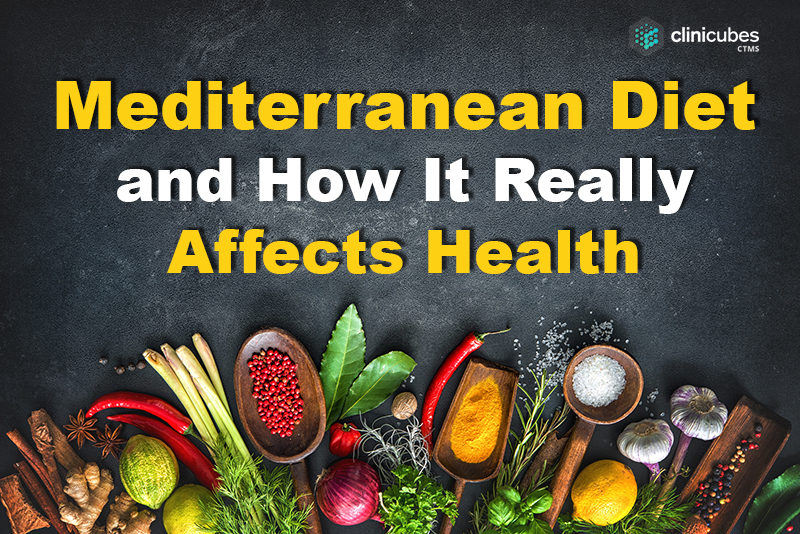Mediterranean Diet and How It Really Affects Health

Mediterranean diet has been thoroughly discussed in the newest clinical trial lead by Dr. Antoni Sureda, one of the Directors of INPST. The study shows the significance of the diet and how it affects health. Precisely, the new publication highlights that the adherence to this type of eating habit is linked to a good profile of low plasmatic inflammation markers, especially in the male adult population. The researchers lead a study among 219 males and 379 females of the Balearic Islands population (12–65 years of age), to assess specific inflammatory markers among them and in relation to the adherence to their Mediterranean diet.
The Mediterranean eating habit consists of high intake of vegetables, legumes, fruits and nuts and unrefined cereals as well as a high intake of olive oil. On the opposite, the diet is also characterized by low intake of saturated lipids, a moderate intake of fish and a low-to-moderate intake of dairy products and a low intake of meat and poultry, and moderate intake of ethanol, primarily wine.
The importance of the study is related with the growing popularity of the Western diet and precisely the health risks associated with it. Nowadays, a diet rich in meat, processed foods and sweets is increasingly more common in the population (including Balearic Islands inhabitants), affecting young and adult individuals. Nevertheless, it seems that the Mediterranean diet, is not only linked to more health benefits than expected, but also shows significant drop in plasmatic inflammation markers when followed consistently.
The chronic inflammation has been involved as a potential mediator for the development of many cardio-metabolic diseases. Low-grade systemic inflammation appears to be at the core of the pathophysiology of obesity, insulin resistance, cardio vascular disease and the anomalous coagulation process. It has been also lately proposed that the markers of systematic inflammation may be included in the metabolic syndrome definition. The latter is a cluster of common cardiovascular risk factors, including central (abdominal) obesity, hyperglycemia (high levels of blood sugar), low high-density (HDL) lipoprotein-cholesterol concentrations (“good” cholesterol), hypertension and hypertriglyceridemia. Elevated levels of triglycerides, for example, are associated with atherosclerosis, even in the absence of high cholesterol levels. They are a predispose to cardiovascular disease, type 2 diabetes, thus implying a greater risk of mortality.
On the other hand, studies evaluating the association of the adherence to Mediterranean diet with diverse inflammatory biomarkers in healthy individuals reported inverse correlations. The protective effects of the Mediterranean diet may result in low-grade chronic inflammation.
Although there is an increase of the cases of metabolic syndrome with age in both sexes, the strict following of the Mediterranean diet in adolescent males was linked with higher levels of adiponectin (a protein hormone that modulates a number of metabolic processes, including glucose regulation and fatty acid oxidation) and lower levels of leptin, TNF-α, PAI-1 and hs-CRP (the inflammatory markers). In females, higher adherence was associated with lower levels of leptin, PAI-1 and hs-CRP. It could be also concluded, that the low adherence to the Mediterranean dietary pattern is directly associated with a worse profile of plasmatic inflammation markers, and therefore with higher risk of cardiovascular diseases, metabolic syndrome and type 2 diabetes.
The main finding of the presented study shows that a healthy and diligent dietary pattern is not only linked to a better health status, but also to a protective effect of chronic diseases. The Mediterranean diet has been also proposed as one of the determinants of the longevity of the populations which follow it. Furthermore, other trials suggest that a long-term consumption of a Mediterranean-style diet may be an effective dietary strategy for protecting against metabolic syndrome, type 2 diabetes mellitus and cardiovascular disease.
At last, the presented results show that strict adherence to the Mediterranean eating habit is directly associated with a low profile of plasmatic inflammation markers, especially in the male adult population. Evidence that overeating and adiposity contribute to systemic inflammation and development of metabolic syndrome raises the possibility that lifestyle changes may reduce risk factors for cardiovascular disease. Future studies will now have the possibility of exploring whether the lowered risk associated with lifestyle changes is mediated by lowered systemic inflammation.
“Adherence to the Mediterranean Diet and Inflammatory Markers
Abstract
The aim was to assess inflammatory markers among adults and adolescents in relation to the adherence to the Mediterranean diet. A random sample (219 males and 379 females) of the Balearic Islands population (12–65 years) was anthropometrically measured and provided a blood sample to determine biomarkers of inflammation. Dietary habits were assessed and the adherence to the Mediterranean dietary pattern calculated. The prevalence of metabolic syndrome increased with age in both sexes. The adherence to the Mediterranean diet in adolescent males was 51.3% and 45.7% in adults, whereas in females 53.1% and 44.3%, respectively. In males, higher adherence to the Mediterranean diet was associated with higher levels of adiponectin and lower levels of leptin, tumor necrosis factor alpha (TNF-α), plasminogen activator inhibitor 1 (PAI-1) and high-sensitivity C-reactive protein (hs-CRP) in adults, but not in young subjects. In females, higher adherence was associated with lower levels of leptin in the young group, PAI-1 in adults and hs-CRP in both groups. With increasing age in both sexes, metabolic syndrome increases, but the adherence to the Mediterranean diet decreases. Low adherence to the Mediterranean dietary pattern (MDP) is directly associated with a worse profile of plasmatic inflammation markers.”
Find the original publication of the article here:
Adherence to the Mediterranean Diet and Inflammatory Markers (PDF Download Available).
Authors: Antoni Sureda; Maria del Mar Bibiloni; Alicia Julibert; Cristina Bouzas;
Emma Argelich; Isabel Llompart; Antoni Pons and Josep A. Tur
You can also connect with our new partners from the INPST, where you can find a lot of articles about health-related clinical trials and research.
Our clinical trial management system, Clinicubes CTMS, offers integrated solutions for every aspect and phase of clinical research. In its core, the software is systematized, well-built and easy-to-use. Clinicubes delivers easier way for collecting, retaining and archiving patient and scientific data. Clinical research professionals can take full advantage of the system to increase their team’s productivity and the number of successfully completed clinical tasks and trials.
You can download the PDF version of this article here: Mediterranean Diet




